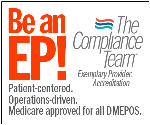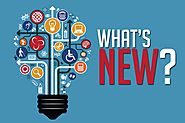-
About
- About Listly
- Community & Support
- Howto
- Chrome Extension
- Bookmarklet
- WordPress Plugin
- Listly Premium
- Privacy
- Terms
- DMCA Copyright
- © 2010-2025 Boomy Labs

 Gail Zahtz
Gail Zahtz
Listly by Gail Zahtz
The world of medical equipment, assistive technology, home care and other products and people that help those with health needs directly. This list includes the major organizations, events, magazines, some general articles and more into understanding this field that impacts so many daily lives.

HME Business covers the entire spectrum of the HME (health medical equipment) industry with in-depth news, analysis, product trends and feature stories reported from a product perspective. HME Business was formerly known as Home Health Products.

Mobility Management provides editorial and news coverage of seating and mobility home medical equipment. Find information on products, technology, research and news on wheelchairs, mobility, seating and more. For the professionals in the mobility business- a lot that other industries and patients can learn from.

National Coalition for Assistive and Rehab Technology supports Complex Rehab Technology for individuals with disabilities and people with medical conditions. NCART focuses on ensuring an Individual's Right to Appropriate Complex Rehab Technology.
About NCART
Ensuring Access to Complex Rehab Technology
The National Coalition for Assistive and Rehab Technology (NCART) is a national organization of suppliers and manufacturers of Complex Rehab Technology (CRT) products and services used by individuals with significant disabilities and chronic medical conditions. NCART seeks to ensure these individuals have appropriate access to CRT products and supporting services. In pursuit of that goal, NCART works with consumers, clinicians, and physicians along with federal, state and private policy makers to establish and protect appropriate coverage, coding, supplier standards, and funding policies.
What is Complex Rehab Technology?
CRT includes medically necessary and individually configured manual and power wheelchairs, seating and positioning systems, and other adaptive equipment such as standing devices and gait trainers. This specialized equipment requires evaluation, configuration, fitting, adjustment, or programming to meet the individual’s medical needs and maximize function and independence. These products are designed to meet the specific and unique medical and functional needs of an individual with a primary diagnoses resulting from a congenital disorder, progressive or degenerative neuromuscular disease, or from an injury or trauma.
The primary diagnoses that can require Complex Rehab Technology include, but are not limited to:
Spinal cord injury Traumatic brain injury Cerebral palsy Muscular dystrophy Spina bifida Osteogenesis imperfecta Arthrogryposis Amyotrophic lateral sclerosis (ALS) Multiple sclerosis Demyelinating diseases Myelopathy Progressive muscular atrophy Anterior horn cell diseases Post-polio paralysis Cerebellar degeneration Dystonia Huntington’s chorea Spinocerebellar disease Amputation Paralysis or paresis
In establishing the necessity for CRT, consideration is always given to the person’s immediate and anticipated medical and functional needs. These needs may include, but not be limited to, activities of daily living (ADLs), instrumental activities of daily living (IADLs), functional mobility, positioning, pressure relief, and communication. These are addressed to enable the individual to accomplish these tasks safely and as independently as possible in all environments the individual is expected to encounter.
The provision of CRT is done through an interdisciplinary team consisting of, at a minimum, a physician, an occupational therapist and/or physical therapist, and a CRT Supplier. The team collectively provides both clinical services and technology related services. The individual’s medical and functional needs are identified by the clinical team and then these needs are matched to products and configured by the Complex Rehab Technology Supplier.

Programs for consumers by RESNA:
Find a Certified Assistive Technology Professional
If you are a person with a disability or a caregiver, RESNA offers a free, on-line tool to find highly qualified, assistive technology professionals near you. All of the professionals listed in this directory are RESNA certified, which means they have passed an exam to prove that they have the experience and knowledge to provide quality services, and they follow the RESNA Standards of Practice and Code of Ethics. To get the best results, we recommend searching by state; you can then sort the cities by clicking on the heading at the top. http://www.resna.org/member-directory/individual
State Assistive Technology Act Programs
Statewide Assistive Technology Programs are federally-funded programs in almost every U.S. state. These programs offer:
Assistive Technology Financing Programs
Alternative Financing Programs (AFP) can help an individual living with a disability get affordable financial loans to purchase assistive technology. Typical assistive technology purchased through this funding include:
Protection & Advocacy Programs (PAAT)
PAAT programs offer legal and advocacy services to assist individuals with disabilities obtain assistive technology devices and services from numerous funding sources, including Medicaid, Medicare, private insurance companies, special education programs, and state vocational rehabilitation (VR) agencies. Several states have these federally-funded programs.
http://nls.org/Disability/NationalAssistiveTechnologyProject
Position Papers and Provision Guides
Consumers have found RESNA Position Papers helpful in explaining the medical or functional necessity of specific assistive technology devices to insurers and other funding sources. These position papers are free and available for download on the website
http://www.resna.org/knowledge-center/position-papers-and-provision-guides
Assistive Technology Standards Board (ATSB)
The RESNA Assistive Technology Standards Board (ATSB) coordinates the development of voluntary consensus standards in the United States and represents the needs and views of U.S. stakeholders in international standardization forums. You can find information here: http://www.resna.org/assistive-technology-standards-board-atsb
Position Papers and Provision Guides
A RESNA Position Paper on Clinical Practice is an official statement by the organization that, based on the consensus of experts and evidence summarizes current research and best-practice trends in relevant areas of Assistive Technology. These Position Papers on Clinical Practice, issued by the international professional organization, declare the necessity (medical and/or functional) of specific assistive technology devices and services under appropriate circumstances, and guide practitioners in decision making.
Consumers are welcome to join RESNA at a reduced membership price of $75, and receive all membership benefits, including on-line access to the Assistive Technology Journal.
Consumers can use these is they are having trouble getting the support/ funding for components they need in wheelchairs. Providers can use it similarly to support what they feel their patients need.

HME News - The business newspaper for home medical equipment providers. HME News covers all the news relevant to home medical equipment providers. Reporting the journalistic perspective on topics ranging from technology, partnerships and market-by-market best practices, HME News is the one source that covers it all-in print and online.
It's a bit difficult to read and understand for someone who is on the consumer side- but hidden within an outdated navigation there are hidden gems of articles that can give you a lot of relevant information that can help whether you're a business or consumer in the medical supply arena.
One point that's clear- Medicare reimbursement has been a long term high point issue for home medical equipment- perhaps it's time to look at other ways than medicare for making sure that people get what they need when it comes to disability equipment.
